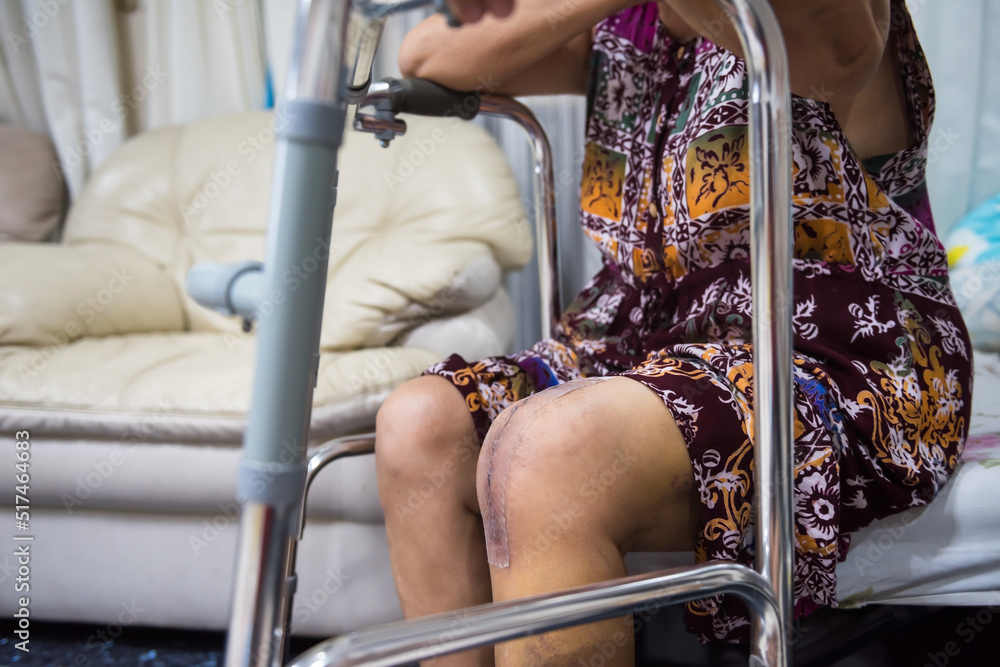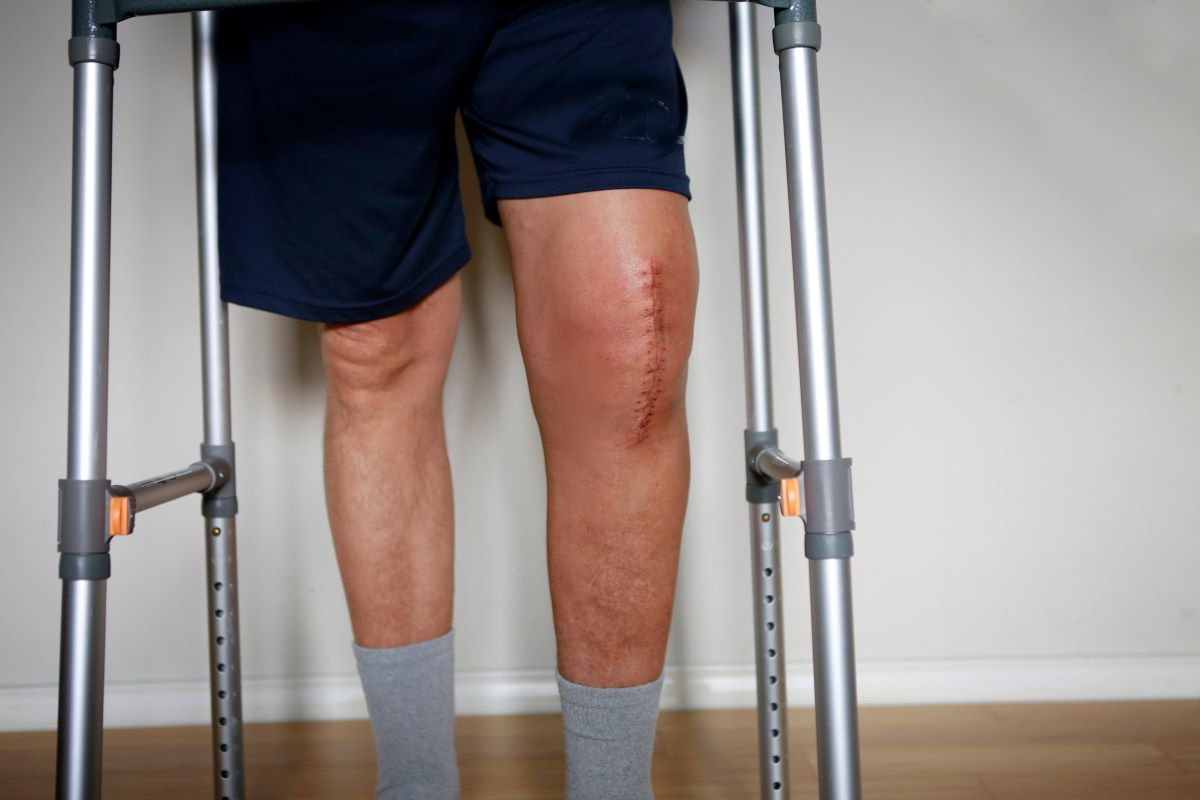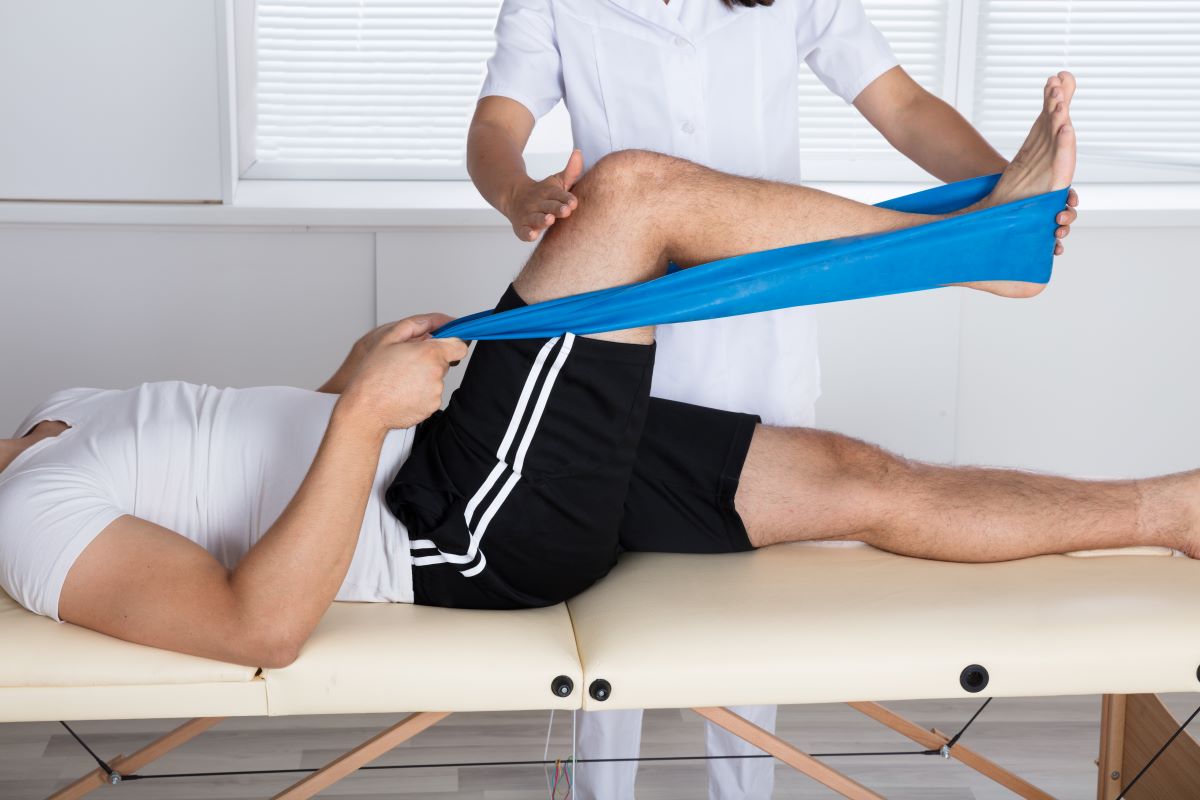Tips to Speed Up Recovery from Knee Replacement Surgery
If you or someone you know is recovering from knee replacement surgery, you know how challenging it can be.
I remember just wanting to get rid of my knee pain and swelling and return to my normal activities!
So, I went to work to find the best ways to heal faster.
Seriously, who has time to be down and out of commission??
The good news is that I found several great ways to speed up my recovery after surgery and get back to my normal everyday activities faster!
I found that doing my physical therapy program and home therapy plan, controlling my knee pain and swelling, and following post-op recommendations from my surgeon and therapist were important for a quicker recovery.
Just remember that everyone’s recovery is going to be different, so what worked for me may not work for you.
Don’t compare your journey with anyone else – focus on your progress—no matter how small it may seem.
With a positive mindset and a go get em attitude, you can have a successful recovery.
The following guidelines may help to get you to get back to your normal active life quickly!

Things that Can Alter Recovery From Knee Replacement Surgery
Your recovery timeline could be altered due to several things, including:
- Age: Older people can take a little longer to recover.
- Overall health: People with pre-existing health issues, such as diabetes and severe arthritis, can have a more difficult recovery.
- Lack of Motivation: Anyone who refuses to work hard in physical therapy and do their home exercises will find it extremely hard to recover successfully.
Pre-Surgery Preparation
Getting your body prepared before surgery is just as important as caring for your body after surgery.
So, here are a few ways to get your body ready for battle!
Physical Conditioning
Try to stick to your fitness routine if you have one.
The stronger you are going into surgery, the better your recovery can be.
Working on the range of motion in your leg is also important; if your range of motion sucks before surgery, then you will be struggling even more to get it back after surgery
I continued my low-impact activities, like weightlifting, bicycling, and walking, until the day before surgery.
Focus on strengthening the muscles that support your knee, such as the quads and hamstrings.
Yoga can also be helpful with improving your balance and flexibility.
This can also help with weight control becuase the more you weigh the more unnecessary strain you put on your new knee.
Anything you can do to stay active and strong is a big bonus for your recovery!
Nutrition
A healthy diet leading up to surgery can be helpful.
Did you know that lean protein is great for healing wounds and building lean muscle? Well, it is, so be sure to increase that in your diet.
Also include plenty of fruits and vegetables, as well as whole grains in your meals.
Don’t forget the importance of staying hydrated.
Be sure to drink plenty of water and stay away from sodas and high-calorie drinks.
Get in the habit of healthy eating, not only will it be important after surgery, but it’s also good for us as we age.
READ MORE: 15 Easy Ways To Boost Water Intake For Older Adults | Simply Aging Healthy

Get Your Home Ready
Since you have time before surgery, make sure that the area that you plan to stay in is ready for you.
You don’t want to leave this for a family member to do later.
Remember walking will be hard at first, and you will only be going short distances, and of course you will need to use a walker to get around.
One very important thing is to pick an area that doesn’t require you to go up and down stairs.
This will be very difficult to do for a while—again, walker, pain, stiffness!
It’s also a good idea to pick up any throw rugs or electrical cords in your area so you don’t trip and fall … that could be bad!
Make sure that you have a comfortable spot to lie down and sleep.
I slept on the couch and recliner for the first few weeks of recovery.
Having a firm chair to sit in is also helpful because it will make it easier to get up and down.
Mental Preparation
OK, this is a good one!
Be sure to do your homework, talk to friends and family members who have gone through knee replacement surgery, and ask a million questions.
This helped me learn as much as I could, which really helped me to not over think everything like I usually do!
Knowledge is power!
I felt more prepared and less anxious about the surgery.
Post-Surgery Care for Quicker Recovery
You will most likely go home the day of your surgery.
So doing post-surgery care at home is extremely important for a faster recovery from a total knee replacement..
Here are some tips to follow during the recovery period.
Pain Control
Most people are given a nerve block during surgery which really helps with pain …. for the first 12-24 hours….. after that be ready for the pain!
Controlling your postsurgical pain after your knee replacement is huge – I mean, after all, you just had major surgery and it’s gonna hurt!
Personally, I don’t like pain!
So, my advice is to take your pain medicine as prescribed by your orthopaedic surgeon; don’t stop taking your pain medication to early, or you will end up with severe pain that you cannot control.
Decrease Swelling
Ice was my very best friend!
Using ice and elevating the leg were the best ways that I found to decrease my swelling.
So, use your ice packs often!
I actually bought an ice machine that I used most of the time.
It was great for controlling my swelling and inflammation, which in turn helped decrease pain.
You should also keep the surgical leg elevated above the level of your heart when you can – this was huge during my recovery.
Remember, swelling = pain!
Wound Care
Of course, it goes without saying that wound care is very important.
The last thing you need after surgery is a big ol’ infection. It can cause a huge delay in healing.
You will need to keep the wound clean and dry.
Also, remember you can shower, but do not soak your knee in a bath.
Avoid tight clothing and stick to wearing loose-fitting, comfortable clothes. This can help decrease irritation around the wound site.
Let’s be honest: Nothing is better than big, baggy, comfy clothes when you don’t feel great—they are like a big warm hug.
It’s important to avoid scratching or picking at the wound – so keeps your hands out of there!
Again, increasing your lean proteins will also be helpful with wound healing.

Physical Therapy
OK, let’s just say that physical therapy is not going to be fun, and quite frankly, it’s gonna hurt…. a lot!
But that being said, it is a super important key to returning to your previous activity level.
It helps to improve, most importantly, your range of motion, and also your strength, and flexibility.
Your physical therapist will work with you to develop a rehab plan designed for you and your personal fitness level.
It will include gentle exercises and stretches to get you moving – but let’s be honest, those gentle exercises will be pure torture.
During physical therapy, you will be doing a lot of simple things like heel slides, ankle pumps, and lateral walks with mini resistance bands.
However, they will not feel simple.
You will also be introduced to exercises using ankle weights that will feel like they attached a lead ball to your ankles.
Yes, sir, nothing but fun.
READ MORE: Ankle Weights After Knee Replacement: Are They Good For Recovery? | Simply Aging Healthy

Exercises and Stretching
You will also be given a home exercise program with specific instructions – DO THE EXERCISES!
If you think that you will get everything back by going to physical therapy a few times a week for 45-60 minutes, you’re just kidding yourself.
To get better, you have to do your home exercises; it’s the only way this will work.
Your home program is where you will make the most of your gains if you do it religiously! DO NOT skip it.
Also, don’t forget to go for a short walk often; don’t just sit around and get stiff.
This seems simple, but it will kick your ass at first.
Get Plenty Of Rest
Getting enough rest is important.
When you sleep, your body can repair and grow muscles and increase metabolism. It also helps with memory, decision-making, and reaction time.
This is a big key that is often overlooked when you are trying to heal your body.
READ MORE: How To Get The Best Sleep After Knee Replacement Surgery | Simply Aging Healthy

Lifestyle Modifications
Activity Adjustments
After knee surgery, you will want to modify your daily activities to avoid putting too much strain on your new knee.
You will need to use assistive devices at first starting with a walker for the first few weeks. You will then either go to crutches or a cane for a few weeks to help you get around without putting too much pressure on your knee.
As you start to feel better, you can then begin to gradually increase your activities.
However, it is super important to listen to your body and not push yourself too hard.
You can start with doing low-impact exercises, like walking or cycling on a stationary bike until you get your stregth and balance back.
This will help you to regain strength and flexibility in your knee without putting too much strain on it.
Diet and Nutrition
Good nutrition can also help speed up your recovery after knee surgery.
I started by increasing my protein intake even before surgery to help to build muscle.
After surgery this can help with wound healing as well as muscle building.
Don’t underestimate the benefits of drinking a lot of water to stay hydrated.
Supplements like vitamin C and omega-3 fatty acids are also important to help speed up your recovery.
These supplements have anti-inflammatory properties that can help reduce swelling and promote healing.
READ MORE: 15 Easy Ways To Boost Water Intake For Older Adults | Simply Aging Healthy
Regular Check-Ups
After knee surgery, it is important to attend regular follow-up appointments with your doctor to monitor your progress and ensure that your knee is healing properly.
During these check-ups, your doctor will examine your knee, assess your range of motion, and check for any signs of infection or complications.
It’s important to let your healthcare providers know if you have any concerns or issues.
They may be able to give you additional medical advice to help with whatever you are dealing with.
Support Systems
Family and Friends
A strong support system is important for a speedy recovery after knee surgery.
Family and friends can offer emotional support, assist with daily tasks, and provide transportation to and from medical appointments – because there is no way that you are going to be driving yourself!
It’s important to let them know what your needs and limitations are so that they know how to help you.
Support Groups
Joining a support group may also be helpful for you – especially if your support circle is limited.
A support group provides a sense of community and understanding of the challenges and experiences of recovery.
Support groups can also offer practical advice and resources since they are going through the same things.
Ways to Speed Up Knee Replacement Recovery
The road to recovery following a joint replacement surgery is more than just doing one thing.
You have to be hypervigulant with diet, exercise, pain control, wound care and don’t forget plenty of rest.
Following a personalized rehab plan that your physical therapist will develop for you is super important for a quick recovery.
A positive mindset….. and a sense of humor …. can also help in the healing process.
Be sure to discuss any issues or concerns with your healthcare team.
As a nurse, I can tell you that they can’t help you if they don’t know what’s going on.
With the right support and dedication, you will regain mobility and return to your daily activities more quickly and with greater ease.
As always, I wish you the best with your recovery and new joint.
Let me know how it is going for you!
I am here to support you – because I know it can be pure hell – but you will be glad you went through it!
It will give you your life back!

Thoughts getting both done at same time?
I personally would not recommend this. You will be very limited with pain and range of motion with just one knee being done. My dad had both knees done at the same time and he found it very difficult and painful to get around. Getting to physical therapy and doing his exercises was very difficult for him. I would think that it would delay recovery. I would encourage you to discuss with your surgeon before considering this.
I’m having difficulty sleeping. I’m awake a good part of the night. This leaves me with little energy during the day.
I am 3 1/2 weeks out from my second total knee replacement. I totally agree with everything you have said here. I have been walking for a week now with no assistance from my cane. I do my home exercises daily and go to physical therapy twice a week. Like you I slept in a recliner and on the couch for the first couple of weeks.
I also would not recommend having both done at the same time. I can’t imagine how much harder the recovery would be.
Thank you for sharing your story!
I am so glad that you are doing well!
Thank you so much for this wonderfully detailed article on what to expect and how to prepare for surgery. I have been putting this off for so long because the aftercare is described so differently by so many people. I live by myself and I don’t know how I will get through it. Your explanation has answered a lot of questions for me. Thank you so very much for taking time to write this informative article.
I am so glad that you found this helpful! I’m sure that you will do great, but I do understand your concerns for the first few weeks following surgery.
Maybe you could consider a home health aide a few hours a day for a week or two or a family member or friend could stop over a few times a day.
Let me know when you have it done and how you are doing.
I am 73 and 4 months post knee replacement and totally have to agree with everything you said to do here. I was faithful in doing my PT and doing the home exercises. Unfortunately the pain meds didnt work for me for my pain at all. Even though the dr increased and tried others they did not help with my pain I was having. It was alot of nerve pain. It wasnt until I started on Gabapentin for the nerve pain did I finally get relief and could see the progress. I am tapering off it very slowly so when the nerves awaken again they will hopefully reconnect and I can tolerate it. For anyone who isnt getting relief from the nerve pain ( if you have that) from the usual pain meds pursue the dr for something to help with nerve pain. It was like night and day for me and I was able to get through my therapy and progress in my recovery. Like you said everyone is different and responds differently.
Thank you so much for sharing your story with us. I’m sure that this will be very helpful for anyone experiencing nerve pain.